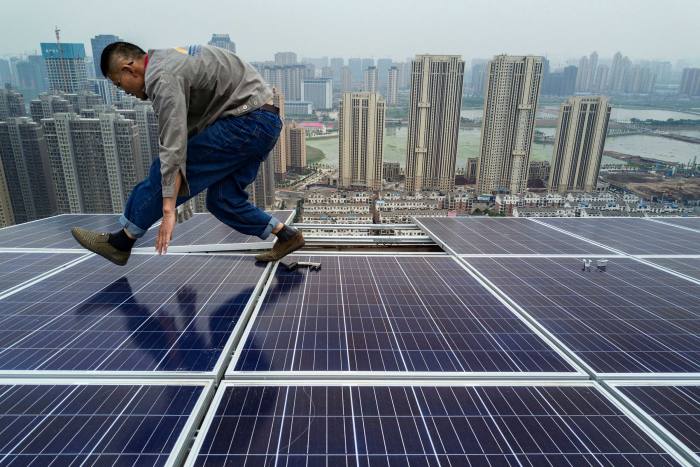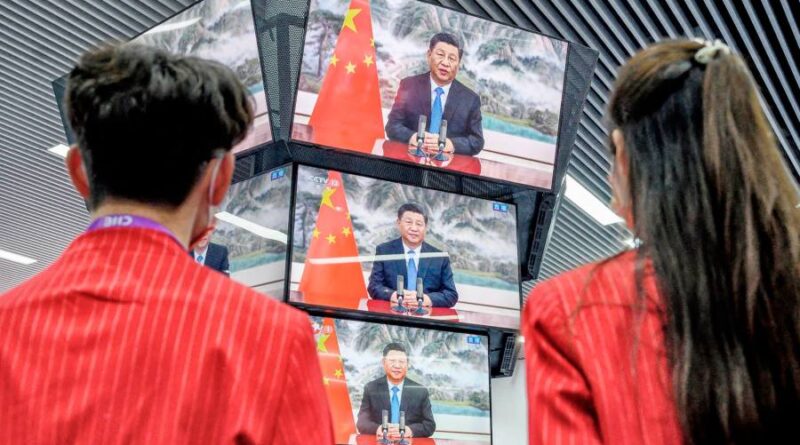China turns inward: Xi Jinping, COP26 and the pandemic
In early 2017, Xi Jinping strode on to the stage at Davos, high in the Swiss alps, and stunned the world’s financial and political elites with a defence of globalisation and the liberal economic order.
Flanked by the biggest ever delegation of senior officials from Beijing, Xi’s presence at global capitalism’s spiritual home marked the first time a Chinese leader had attended the World Economic Forum in person. He calmly offered leadership and stability against the crumbling facade of western legitimacy following the election of Donald Trump and Brexit.
Back in Beijing 10 months later, Xi, starting his second five-year term as leader of the Chinese Communist party, cemented his vision for the country’s newfound position in the global order: “It is time for us to take centre stage.”
Yet this week, as world leaders gathered in Glasgow for the COP26 climate summit, Xi — the leader many believe is China’s strongest since Mao — was missing. Xi’s conspicuous absence from Glasgow drew a quick rebuke from Joe Biden. The US president claimed China had “walked away” from the climate challenge and that Beijing had undermined its own efforts to “assert a new role as a world leader”.
However, for many experts, Xi’s decision to stay at home since the start of the pandemic reflects a deeper shift: China, responding to acute domestic pressures and mounting hostility abroad, appears to be turning inward.

“The pandemic has been a facilitator for Xi’s China to move inward and partly decouple with the west,” says Jean-Pierre Cabestan, a professor of political science at Hong Kong Baptist University. “There have been many forces at play in China for some time, all heading in the same direction: decoupling and isolating China [to] better protect her from foreign hostile forces or ideas. The overarching objective of all this is to strengthen and consolidate one-party rule and make sure that the CCP reign will last for ever.”
Deep within Zhongnanhai, the leadership compound in Beijing, Xi is in the midst of orchestrating an unparalleled overhaul of China’s business landscape, while also grappling with rising Covid cases and crippling energy shortages. Looking offshore, he sees Biden steadily rebuilding alliances among democratic nations who fear China’s growing military might.
Against this backdrop, Xi’s step out of the international limelight has sparked questions at home and abroad. Just how far can China retreat back into its shell? And what might this trend mean for engagement — across business, climate change, geopolitics and culture — with the world’s most populous country?
The ‘lonely island’
Almost two years after the coronavirus pandemic exploded from Wuhan, and just as much of the rest of the world reopens and reconnects, China is charting a different course.
An outbreak of the highly infectious Delta variant, first noticed in Inner Mongolia in October, has spread to about two-thirds of China’s provinces but has only caused 800 infections. Beijing is deploying a familiar playbook: travel bans and mass testing, targeted lockdowns and quarantines.

Accounts from across China reflect mostly sober co-operation with the rules. But there are also signs of quiet frustration, and rare episodes of chaos and panic.
On Sunday, 30,000 revellers at a Halloween party were locked inside Shanghai Disneyland for hours to undergo testing following the discovery of a single case linked to the Chinese theme park a day earlier. Days later, following reports of three positive coronavirus infections in Changzhou, a city in eastern China, schools closed their doors and crowds swarmed supermarkets, desperately stocking up on supplies and food.
The quick containment of each cluster in recent weeks has “only increased policymakers’ confidence” in their approach, says Ernan Cui, a China analyst at consultancy Gavekal.
And yet, Cui says, it has also become evident that Beijing’s current homegrown vaccine technology cannot yet support a zero-tolerance policy. “A technological silver bullet to completely stamp out Covid may never be achieved,” she notes.
China’s policy of “zero tolerance” has been successful in suppressing the death toll — the official tally is fewer than 5,000, compared with 730,000 in the US and 140,000 in the UK. But as lockdowns and travel restrictions have been retightened, despite the nearly 80 per cent of China’s 1.4bn people being fully vaccinated, there are few signs of a clearly articulated exit strategy.
Now edging towards a third year of the coronavirus-era — and with questions hovering over the efficacy of China’s vaccines — some of the longer-term implications of its isolation have come into sight.
Cut off from the outside world and with mounting reasons to forge ahead with self-reliance, a slower-burning, possibly irreversible trend towards localisation has gathered pace in China. Surveys show that, increasingly, Chinese consumers favour local brands over foreign ones and Chinese job hunters would rather work for a successful Chinese company than a multinational. These trends dovetail with Xi’s plans for “dual circulation” — a policy of expanding production at home while shifting the focus toward output for domestic consumption.
“Xi Jinping has attached a lot of political capital to achieving and maintaining ‘zero Covid’, so it’s not clear how they’re going to steer the public around to understand they will need to live with it at some point,” says David Webb, a Hong Kong activist investor. “It suits dual circulation and it suits the party’s great [internet censorship] firewall because the great majority of people can’t travel any more and can’t be exposed to foreign ideologies and different points of view about China. That probably suits Xi just fine.”

An exodus of foreigners from China has also accelerated. Nearly two years of strict visa and quarantine rules has made expat life in China no longer sustainable for many. According to one western business executive who is calling time on a job in Shanghai, the moment appears “pivotal” in the context of ties between China and the outside world.
“Will China look at this and say: ‘we’ve lost all of these foreigners because of the Covid restrictions, maybe we don’t need them, and we’ll just go it alone?’” he asks. “That’s certainly possible.”
Third term beckons
On Monday, the Chinese Communist party’s top political organ will meet to lay the groundwork for Xi to continue as head of the party and president beyond two terms. For China, the CCP central committee’s Sixth Plenum has distinct echoes from history: both Mao Zedong and Deng Xiaoping used the meetings to secure their long reigns as transformational leaders.
Xi’s third term appears to many now as a fait accompli, marking a dramatic change from 2012 when the then newly-minted leader stoked hopes of economic reform and further opening. In tracing the leader’s turn towards isolation, some believe the roots took hold in the early moves Xi made after taking over the leadership nearly a decade ago. Others, however, say the west, and chiefly successive US presidents, are not without blame.
Cabestan, of Hong Kong Baptist University, points to a suite of policies designed to wean China off its reliance on foreign technology and make its economy less dependent on outside markets. “Putting in line Hong Kong has been part of this strategy: better inoculating China from western ideological poisons . . . and in taming or rebuilding of the Hong Kong civil society according to CCP standards,” he says.

Yu Jie, senior research fellow at Chatham House, a London think-tank, says Beijing’s actions are “direct derivatives” of American policies toward China. Xi and his top lieutenants have learnt from their time dealing with Trump and his “excruciating” trade war.
“Turning inward is not a wholesale package. The Chinese government has now chosen carefully . . . areas with strategic importance, [areas in which] Beijing holds firmly on ‘self-reliance’,” she says. “Beijing is thinking about the survival of the party by building economic resilience and preparing for its relationship with the US to worsen further.”
Xi and Biden are expected to hold a virtual summit before the end of the year, one of the first signs of a potential thaw in ties since Biden took office. But for Xi and China the international landscape has only become more hostile under this US president, notes Chen Jie, an international relations professor with the University of Western Australia.
“The US and major EU countries have simultaneously strengthened their condemnation and countermeasures against China on the issues of Hong Kong, Xinjiang, Taiwan and the South China Sea . . . Overseas visits in this atmosphere are very difficult.”
Can co-operation be rescued?
In the months leading up to the meetings in Glasgow, climate campaign groups and governments, including the US, clamoured for greater ambition from China, the world’s biggest polluter.
John Kerry, Biden’s climate envoy, was hopeful that despite the US’s concurrent corralling of countries to challenge China’s rise, the global effort to save the planet from rising greenhouse gas emissions could be kept separate.

Yet after Biden’s snipe at Xi this week, it was obvious that climate could not be separated from US-China tensions. Absent a sudden course correction from Xi, or Biden, the prospect for meaningful dialogue and collaboration between the world’s two most important countries will remain severely limited.
“The US and Soviet Union managed to reduce nuclear warheads not because they were friends with each other, but because they saw the significant benefits of synchronised action,” says Li Shuo, a Beijing-based Greenpeace energy expert. “This trust does not exist between Washington and Beijing now.”
Still, for many leading experts, the no-show by the leader of the world’s biggest polluting country does not signal an abandonment of Xi’s stated commitments to radically overhaul its coal-dependent energy system. China might be turning inward, but it is forecast to spend $3.4tn over the next decade to reduce emissions, more than the US and EU combined.
“The fact that Xi Jinping didn’t attend [COP26] is by no means ‘walking away’,” says Priscilla Lu, who leads sustainable investments in Asia for DWS and is an advisory member of the People’s Bank of China’s green finance committee. “He [Xi] knows that it is politically charged and he is walking into a forum where he couldn’t win. Action is more important.”
Additional reporting by Emma Zhou and Xinning Liu in Beijing and Wang Xueqiao in Shanghai

